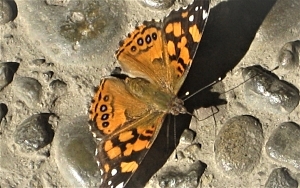Mindfulness and mindful meditation. They’re all the rage right now, but what exactly are they and why should we care?
Mindfulness is another way of referring to awareness.
Mindfulness is paying attention and being in the present moment and doing it intentionally and without judgment. Mindfulness meditation is a meditation practice that invites awareness of thoughts, emotions, and body sensations. Do you need to meditate to be mindful? NO. Does a consistent meditation practice help you to become more mindful? YES.
One of the benefits of both mindfulness and mindful meditation is that we can become more responsive and less reactive. During meditation, we have our point of focus and we notice as thoughts, feelings, sounds, or sensations float in and float out. We can sit and observe, or we can react. Sometimes meditation can be challenging. We have disturbances and irritations that interrupt our focus. Our meditation practice is a microcosm of our bigger emotional lives. We have daily disturbances and irritations that interrupt our flow. We can learn to respond in more positive and productive ways.
How does what we experience in meditation translate into our waking life?
Think about when we have an itch on our arm. We react by immediately scratching. We don’t even think about it. We just dive in with a scratch to relieve the itching. But what if we didn’t scratch right away? What if we paused for a moment and were curious about what an itch actually feels like? What are the characteristics of that itch? How much surface area does it take up? Is it a strong or mild sensation? If you had to draw a picture of the sensation, what would it look like? How long does that itch last? In denying ourselves the scratch for quick relief, does our stomach tighten up? Do we become irritated or anxious? Pausing and being curious about this itching sensation give us choices. We can scratch, or we can wait to scratch. We can see how long the sensation lasts and perhaps ride the wave as the itch lessens in intensity. We can notice how long it takes to disappear.
Now let’s think about a more challenging situation that could pop up in our life.
Can you think about a time when you’ve been reactive? Maybe you are in line at the grocery store and the person in front of you is moving slowly, taking their time, and chatting away with the clerk. You think, “What are they doing? Don’t they know this unacceptable?” You want to scream “Stop talking and hurry the *$#! up!” That’s being reactive. Instead of screaming (just like immediately scratching that itch), you could try to be curious about what’s going on inside of you. Why are you angry and frustrated? Why are you feeling anxious about this situation? Maybe this is the third time this week that you’ll be late to work, and you might lose your job. Maybe you have a splitting headache and just want to get home and lay down. Maybe you think holding up the line is disrespectful. What really matters is that this situation is charged for some reason and it’s really bothering you. How are you experiencing this anxiety in your body? Is your throat tightening up? Is your heart rate increasing? Are your palms getting sweaty? When you take some time to examine what’s going on with a situation that’s charged in some way, you can actually slow yourself down. If you’re running late, is screaming at someone going to get you there any faster? Can you do a quick body scan or breathing exercise instead? Can you look for the absurdity in the moment? Choosing something different is being responsive instead of reactive.
Pausing and choosing a different response is being mindful.
In addition to becoming less reactive and more responsive, other benefits of mindfulness and mindful meditation are reduced stress, improved emotion regulation, increased focus, and increased empathy. Practicing mindfulness meditation can lower blood pressure, decrease anxiety levels, and help promote clarity in thinking and perception.
Why should you care about mindfulness? Why wouldn’t you? Simply put, mindfulness and mindful meditation help to support, enhance, and strengthen our physical and mental health and can assist us in living happier, healthier, and more fulfilled lives.









